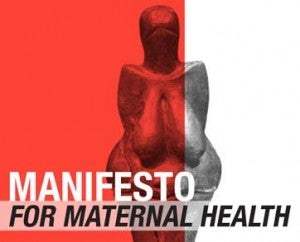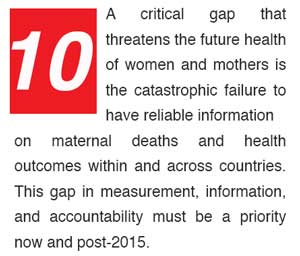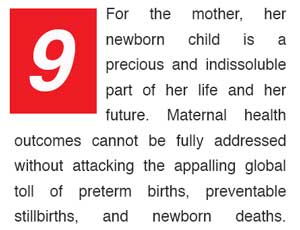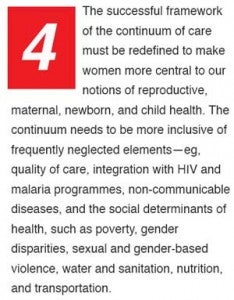 To celebrate the one-year anniversary of the “Manifesto for Maternal Health”—co-authored by Ana Langer, Richard Horton, and Guerino Chalamilla—the Maternal Health Task Force is highlighting the work of numerous organizations around the world to improve maternal health. The manifesto, written following the Global Maternal Health Conference 2013 in Arusha, Tanzania, was a call to action for 12 critical issues related to maternal health that were in dire need of more attention. While much work remains, it is truly exciting to reflect on all of the work that has been accomplished over the past year within the 12 core areas of the manifesto.
To celebrate the one-year anniversary of the “Manifesto for Maternal Health”—co-authored by Ana Langer, Richard Horton, and Guerino Chalamilla—the Maternal Health Task Force is highlighting the work of numerous organizations around the world to improve maternal health. The manifesto, written following the Global Maternal Health Conference 2013 in Arusha, Tanzania, was a call to action for 12 critical issues related to maternal health that were in dire need of more attention. While much work remains, it is truly exciting to reflect on all of the work that has been accomplished over the past year within the 12 core areas of the manifesto.
This post showcases the work underway and accomplished over the past year of our colleagues at PLOS Medicine and PLOS Pathogens to improve global maternal health.
From our colleagues at PLOS Medicine:
“PLOS continues to publish high-quality, open access research and commentary as part of our commitment to increasing the evidence base for approaches to improve maternal health. Open access publication ensures this crucial evidence is freely available to read and use throughout the world without restriction.”
In line with point 4 on the manifesto, PLOS Medicine, in partnership with the Maternal Health Task Force, published a special collection of research on the theme of “maternal health is women’s health”, which generated numerous publications that take a closer look at maternal health issues within the broader context of women’s health.
PLOS Medicine also worked with the MHTF to host a special launch event for the collection that brought together several authors (Suneth Buddhika Agampodi, Nosakhare G. Orobaton, and Cynthia K. Stanton) to discuss the practical implications for women of their research in Sri Lanka, Nigeria, and Ghana. Watch the dialogue here.
 In line with point 10 of the manifesto, PLOS Medicine published “Measuring Coverage in Maternal, Newborn, and Child Health,” a special PLOS Collection in partnership with the Child Health Epidemiology Reference Group (CHERG), which presents innovative assessments of the validity of measuring population coverage for health interventions. Learn more about the collection here.
In line with point 10 of the manifesto, PLOS Medicine published “Measuring Coverage in Maternal, Newborn, and Child Health,” a special PLOS Collection in partnership with the Child Health Epidemiology Reference Group (CHERG), which presents innovative assessments of the validity of measuring population coverage for health interventions. Learn more about the collection here.
In line with point 9 of the manifesto, PLOS Medicine and the MHTF issued a call for papers for a special collection under the theme: “Integrating health care to meet the needs of the mother-infant pair.” Through this call for papers, PLOS Medicine and the MHTF aim to generate evidence around what works (and what doesn’t) when it comes to integration—with special attention to the ways that infant and maternal health are inextricably linked. Take a look at the call for papers here.
PLOS Pathogens
PLOS Pathogens has published numerous papers over the past year that represent critical evidence related specifically to points 4 and 9 of the manifesto.
 The following papers provide evidence for the adverse effects of malaria in pregnancy impacting maternal and fetal health:
The following papers provide evidence for the adverse effects of malaria in pregnancy impacting maternal and fetal health:
- Intravital Placenta Imaging Reveals Microcirculatory Dynamics Impact on Sequestration and Phagocytosis of Plasmodium-Infected Erythrocytes
- Plasmodium falciparum Malaria Elicits Inflammatory Responses that Dysregulate Placental Amino Acid Transport
This paper demonstrates that infection of the placenta (Listeria) can lead to pregnancy complications as well as fetal and maternal disease and death:
This paper demonstrates that HCMV primary infection during pregnancy can result in up to 75% of congenital infections and is a known cause of fetal death:
Please join the conversation! Tell us about your work to improve maternal health over the past year and how it relates to the calls to action from the manifesto. Send an email to Kate Mitchell or Natalie Ramm or join the dialogue on Twitter using the hashtag #MHmanifesto and help us celebrate the anniversary of the manifesto for maternal health!

